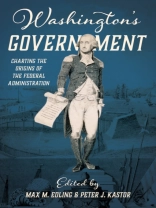Washington’s Government shows how George Washington’s administration—the subject of remarkably little previous study—was both more dynamic and more uncertain than previously thought. Rather than simply following a blueprint laid out by the Constitution, Washington and his advisors constructed over time a series of possible mechanisms for doing the nation’s business. The results were successful in some cases, disastrous in others. Yet at the end of Washington’s second term, there was no denying that the federal government had achieved remarkable results. As Americans debate the nature of good national governance two and a half centuries after the founding, this volume’s insights appear timelier than ever.
Contributors Lindsay M. Chervinsky, Iona College * Gautham Rao, American University * Kate Elizabeth Brown, Huntington University * Stephen J. Rockwell, St. Joseph’s College * Andrew J. B. Fagal, Princeton University, * Daniel Hulsebosch, New York University * Rosemarie Zagarri, George Mason University
สารบัญ
Acknowledgments
Introduction: Creating the Federal Government
1. George Washington and the Cabinet: The Unlikely Development of an Unintended Institution
2. Washington’s Workforce: Reconstructing the Federal Government at the Moment of Its Creation
3. The Theory and Practice of Federalist Political Economy
4. Creating Interdepartmental Collaboration: Federal Judges, the Remitting Act, and Cooperative State Building
5. Indian Affairs and the Relentless American State
6. ‘The Next Great Work to Be Accomplished’: American Armament Policy
7. From Constitution Making to State Building: The Washington Administration and the Law of Nations
8. The Legislative Output of Congress
Afterword: Reflections on the Political History of the Early Republic
Notes on Contributors
Index
เกี่ยวกับผู้แต่ง
Max M. Edling is Reader in Early American History at King’s College London and author of Perfecting the Union: National and State Authority in the US Constitution.Peter J. Kastor is Samuel K. Eddy Professor of History at Washington University in St. Louis and author of William Clark’s World: Describing America in an Age of Unknowns.












